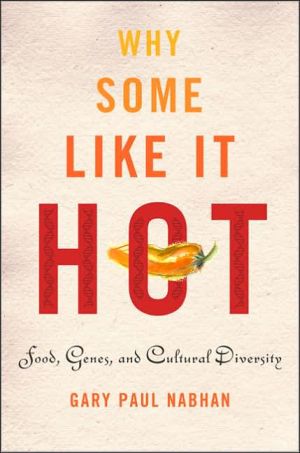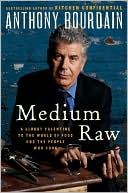Why Some Like It Hot: Food, Genes, and Cultural Diversity
Do your ears burn whenever you eat hot chile peppers? Does your face immediately flush when you drink alcohol? Does your stomach groan if you are exposed to raw milk or green fava beans? If so, you are probably among the one-third of the world's human population that is sensitive to certain foods due to your genes' interactions with them.\ Formerly misunderstood as "genetic disorders," many of these sensitivities are now considered to be adaptations that our ancestors evolved in response to...
Search in google:
Nabhan, an ethnobiologist and nutritional ecologist, examines how our ethnicity determines our digestion. He explains why modern native Americans are prone to diabetes, why Mediterranean diets generally work best for those whose forbears actually came from the Med, and why we should not rely on hot peppers as an infallible aphrodisiac. He urges us to learn about the foods our particular ethnic group used to stay healthy in the home country, and to apply that knowledge to the choices we make as we face globalized victuals. The text is double-spaced. Annotation ©2004 Book News, Inc., Portland, OR Publishers Weekly With 21st-century science promising better living through genetic engineering, and myriad diet fads claiming to be the answer to obesity and disease, this exploration of the coevolution of communities and their native foods couldn't be more timely. Ethnobiologist Nabhan (Coming Home to Eat) investigates the intricate web of culture, food and environment to show that even though 99.9% of the genetic makeup of all humans is identical, "each traditional cuisine has evolved to fit the inhabitants of a particular landscape or seascape over the last several millennia." Sardinians are genetically sensitive to fava beans, which can give them anemia but can also protect them from the malaria once epidemic in the region. Navajos are similarly sensitive to sage. In both cases, traditional knowledge allows safe interactions with these powerful medicine/poisons through cooking methods or food combinations. Nabhan questions the wisdom of genetic therapy, which "normalizes" the "bad" genes that can cause sickness but also enhance immunity. Most inspiring in this bioethnic detective story are Cretans, maintaining their health for centuries through traditional living, and Native Americans and Hawaiians, whose communities, devastated by diabetes, find an antidote by returning to their traditional foods, customs and agriculture. Mixing hard science with personal anecdotes, Nabhan convincingly argues that health comes from a genetically appropriate diet inextricably entwined with a healthy land and culture. (Sept.) Copyright 2004 Reed Business Information.
1Discerning the histories encoded in our bodies152Searching for the ancestral diet363Finding a bean for your genes and a buffer against malaria634The shaping and shipping away of Mediterranean cuisines925Discovering why some don't like it hot1126Dealing with migration headaches1407Rooting out the causes of disease1638Reconnecting the health of the people with the health of the land186
\ Publishers WeeklyWith 21st-century science promising better living through genetic engineering, and myriad diet fads claiming to be the answer to obesity and disease, this exploration of the coevolution of communities and their native foods couldn't be more timely. Ethnobiologist Nabhan (Coming Home to Eat) investigates the intricate web of culture, food and environment to show that even though 99.9% of the genetic makeup of all humans is identical, "each traditional cuisine has evolved to fit the inhabitants of a particular landscape or seascape over the last several millennia." Sardinians are genetically sensitive to fava beans, which can give them anemia but can also protect them from the malaria once epidemic in the region. Navajos are similarly sensitive to sage. In both cases, traditional knowledge allows safe interactions with these powerful medicine/poisons through cooking methods or food combinations. Nabhan questions the wisdom of genetic therapy, which "normalizes" the "bad" genes that can cause sickness but also enhance immunity. Most inspiring in this bioethnic detective story are Cretans, maintaining their health for centuries through traditional living, and Native Americans and Hawaiians, whose communities, devastated by diabetes, find an antidote by returning to their traditional foods, customs and agriculture. Mixing hard science with personal anecdotes, Nabhan convincingly argues that health comes from a genetically appropriate diet inextricably entwined with a healthy land and culture. (Sept.) Copyright 2004 Reed Business Information.\ \ \ \ \ BellaOnline"The author takes the reader on a fascinating gastronomic tour to show how our genes influence our reactions to food, encouraging readers to become aware of their particular cultural heritage and apply this knowledge in their lives."\ — Connie Krochmal\ \ \ \ BellaOnline"The author takes the reader on a fascinating gastronomic tour to show how our genes influence our reactions to food, encouraging readers to become aware of their particular cultural heritage and apply this knowledge in their lives."\ \








